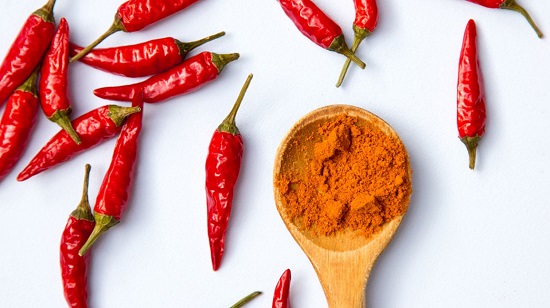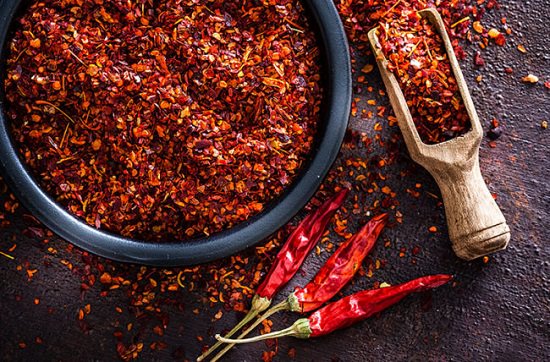Get to know how you can use cayenne pepper for heavy menstrual bleeding besides other home remedies in this informative article.
Heavy menstrual bleeding, or Menorrhagia, is characterized by abnormally heavy bleeding, prolonged bleeding, and acute cramps. The pain and discomfort can disrupt your daily life. Heavy bleeding can lead to anemia if not treated.
Symptoms of Menorrhagia include heavy bleeding requiring more than one sanitary napkin in an hour or double napkins to soak the flow. It can lead to multiple sanitary pad changes during the night, bleeding lasting more than a week among other symptoms. Some of the most common symptoms for menorrhagia are listed below:
- Large blood clots
- Inability to perform daily activities
- Fatigue
- Dizziness
- Shortness of breath
Causes Of Menorrhagia
The cause for heavy menstrual bleeding could be hormonal imbalance due to thyroid problems, obesity, PCOS, or insulin resistance. Other causes include:
- Ovaries dysfunction
- Uterine fibroids
- Benign uterine growths called Polyps
- Adenomyosis
- Endometriosis
- A contraceptive device, i.e., IUDs, pregnancy-related problems
- Cancer
- Genetic medical conditions
- Certain medications
- Medical disorders in other organs like the liver or kidneys.
Young adolescent girls may suffer this condition due to anovulation or the absence of ovulation. In older women of reproductive age, the cause is due to uterine diseases such as fibroids or adenomyosis.
Home Remedies
1. Hydration
You can manage and treat heavy menstrual bleeding with certain home remedies. The first thing to do is drink plenty of water to maintain the blood volume in your body. Both blood and water are lost when you bleed.
2. Vitamin C
Vitamin C helps your body to absorb iron and thereby prevent anemia. Eat foods high in vitamin C such as oranges, lemons, red and green peppers, and kiwis. Simultaneously, eat food items with richness in iron, such as spinach, chicken, and beans.
3. Cast Iron Vessels
Cook your food items in cast iron vessels as it absorbs iron from the vessel and passes it to the food.
4. Vitamin Supplements
Vitamin supplements can help replenish your body. And over-the-counter drugs can help reduce the bleeding and relieve the pain.
5. Heating Pads and Icing
Heating pads can help relax muscles and alleviate painful cramps. Icing the lower belly can also help to reduce blood flow.
6. Kitchen Ingredients
Drinking warm Cinnamon tea helps direct blood away from the uterus, thereby reducing the bleeding. Parsley has anti-inflammatory properties and is rich in vitamin C. Drinking parsley juice promotes iron absorption in your body and reduces inflammation. Apple cider vinegar, blackstrap molasses, flaxseed oil, and basil leaves are other home remedies that help combat heavy menstrual bleeding.
Cayenne Pepper for Heavy Menstrual Bleeding
Cayenne pepper is a common garden plant that produces fruits that have a hot, spicy flavor. You can add it to food for its taste and increase the heat. Cayenne pepper has several health benefits and is effective in treating heavy menstrual bleeding too. It has anti-inflammatory properties and has a compound known as capsaicin that offers pain relief.
Consuming cayenne pepper powder relieves painful muscle cramps during bleeding. It also helps balance hormone levels in your blood. Furthermore, it helps to balance the blood flow in different parts of the body. It regulates blood pressure and stops both internal and external bleeding. Cayenne pepper helps break up blood clots, strengthen blood vessels, improve blood circulation, and shrink uterine fibroids.
Mix half a teaspoon of cayenne pepper powder in a glass of warm water. Add a teaspoon of honey to the mixture and drink it thrice a day to ease heavy bleeding. It is also available in the form of capsules.
It may cause heartburn due to its heat and if you suffer from acidity problems, consult your doctor before using it. Avoid taking cayenne pepper on an empty stomach and always take it with a meal. If you are on blood-thinning or blood pressure medications, take cayenne pepper only after
taking medical advice.
When to See a Doctor?
If heavy bleeding persists and does not resolve with home remedies, seek medical advice. Bleeding between periods, irregular bleeding, and vaginal bleeding after menopause also warrant immediate medical attention. After determining the cause for the bleeding, your doctor may prescribe treatment with hormones, dilation, and curettage, endometrial ablation, ultrasound therapy for fibroids, or surgery.




